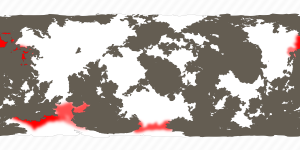Shriaav: Difference between revisions
| Line 16: | Line 16: | ||
== Origins == | == Origins == | ||
The Shriaav are the indigenious people of the [[Kamuran Archipelago]] located between continental [[Davai]] and the [[Shangti Ocean]], south of [[Kisaga]] and west of [[Xian]] and the [[Furong Peninsula]]. Kamura has been populated by humans for thousands of years, recieving several influxes of prehistorical migrants during successive climatic eras contributing to the development of an early native culture. During colder periods large Kamuran islands including [[Kenhara]], [[Ikhisa]] and [[Hanhara]] were connected to the Kisagan Peninsula in the north via land bridges due to lower global sea levels which allowed land migrations from Northern Davai into Kamura. During warmer periods Kamura was a fragmented archipelago similar to today and meant that settlers had to reach the islands by boat. By the end of the [[Proximal Ice Age]] a fusion of northern and southern cultures had melded into early Shriaav society and grew into the [[Murawen Civilisation]], an advanced maritime culture sustained by intensive rice-farming that | The Shriaav are the indigenious people of the [[Kamuran Archipelago]] located between continental [[Davai]] and the [[Shangti Ocean]], south of [[Kisaga]] and west of [[Xian]] and the [[Furong Peninsula]]. Kamura has been populated by humans for thousands of years, recieving several influxes of prehistorical migrants during successive climatic eras contributing to the development of an early native culture. During colder periods large Kamuran islands including [[Kenhara]], [[Ikhisa]] and [[Hanhara]] were connected to the Kisagan Peninsula in the north via land bridges due to lower global sea levels which allowed land migrations from Northern Davai into Kamura. During warmer periods Kamura was a fragmented archipelago similar to today and meant that settlers had to reach the islands by boat. By the end of the [[Proximal Ice Age]] a fusion of northern and southern cultures had melded into early Shriaav society and grew into the [[Murawen Civilisation]], an advanced maritime culture sustained by intensive rice-farming that archaeological evidence shows settled in the first towns and practised [[Kin|proto-Kinnite]] religious practices. | ||
== History == | == History == | ||
Revision as of 21:54, 15 January 2024
| Ethnic group | |||
|---|---|---|---|
 ' | |||
| Height comparison | |||

| |||
| Eye colour |
| ||
| Hair colour and type |
| ||
| Total population | |||
| Location map | |||

| |||
| Regions with significant populations | |||
| Missingflag.png?nolink&40 test Missingflag.png?nolink&40 test | |||
| Languages | Kamuran | ||
| Religions | |||
| Related ethnic groups | |||
| [[ ]], [[ ]] | |||
The Shriaav (Kamuran:Shriaavne) are a Davaian ethnic group originating in western Davai, as well as having settler communities on other continents, particularly in Altaia, Raia and Kupeya.
Origins
The Shriaav are the indigenious people of the Kamuran Archipelago located between continental Davai and the Shangti Ocean, south of Kisaga and west of Xian and the Furong Peninsula. Kamura has been populated by humans for thousands of years, recieving several influxes of prehistorical migrants during successive climatic eras contributing to the development of an early native culture. During colder periods large Kamuran islands including Kenhara, Ikhisa and Hanhara were connected to the Kisagan Peninsula in the north via land bridges due to lower global sea levels which allowed land migrations from Northern Davai into Kamura. During warmer periods Kamura was a fragmented archipelago similar to today and meant that settlers had to reach the islands by boat. By the end of the Proximal Ice Age a fusion of northern and southern cultures had melded into early Shriaav society and grew into the Murawen Civilisation, an advanced maritime culture sustained by intensive rice-farming that archaeological evidence shows settled in the first towns and practised proto-Kinnite religious practices.
History
Culture
Groups
- Kamuraavne - Kamurans
- Zuchaavne - Zuchwenese
- Shriaavne Kisaganvun - Kisagane - Kisagan Shriaav
- Shriaavne Chevun - Chevune - Davaian Shriaav
- Shriaavne Puxen - Puxene - Altaian Shriaav
- Shriaavne Raianvun - Raiane - Raian Shriaav
- Shriaavne Wolchanixe - Ixene - Shriaav living under Wolgos domination - [insert specific page link/s here]